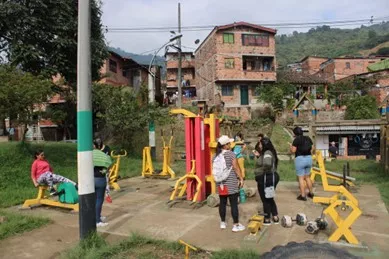The Journey of Care: A care-oriented approach to reshaping travel

The need to care for yourself and others is often an overlooked reason why people travel and is often an underappreciated factor in current transport strategies, according to a new study published by the Transport Studies Unit.
A new study conducted by the Transport Studies Unit in the School of Geography and the Environment at the University of Oxford has shed light on the transformative potential of incorporating 'mobilities of care' into the framework of our transport networks in the future. Their research shows how the needs and concerns of those who depend on transport systems the most must be central within policymaking, and that to create effective and inclusive transportation strategies going forward, a care-oriented approach must be incorporated.
During the COVID-19 lockdown, many questioned the definition of ‘essential’ travel. Researchers from the TSU examined the experiences of low-income women residing in Itagüí, Colombia, during the COVID-19 lockdown to uncover their day-to-day needs and requirements. They examined their encounters with mobility and the complications that this created for their health and overall well-being.
The need to care for yourself and others is often an overlooked reason why people travel. Envisioning transport networks that focus on 'care' instead of the economy can create a more fair and just travel environment, especially for society's most disadvantaged.

Juan Pablo Orjuela, a Senior Research Associate in urban mobility at the PEAK project and co-author of the study, said: “Given that so many activities of care are performed by women, for free, and that transport systems have been built thinking about supporting economic development and not other activities like care, this new focus should help us think about building more equitable cities.”
At its core, this research challenges us to re-evaluate our understanding of care within the infrastructure of transport systems worldwide. Professor Tim Schwanen, Director of the Transport Studies Unit and co-author of the study said: “The research shows how critically important caring for one’s household, extended family, and local community are for how women with very low incomes, whose voices are usually disregarded in transport policy, travel around the city on a daily or weekly basis.’

This work invites policymakers, transport experts, and society at large to embark on a journey toward a more compassionate and inclusive future. “Even more important than work and income generation, care should be placed at the centre of how urban transport systems are designed, planned, and changed for the better,” says Professor Schwanen.
Care is not a destination; it is a continuous motivation for our journeys. Orjuela and Schwanen believe that their research holds a deep relevance for the millions of low-income people living across the Latin American continent and the transport networks they desperately rely on. The critical insights revealed through this research extend the analysis of mobility data beyond the confines of a single trip and allow for an exploration of a multitude of socio-cultural factors that affect transport systems. At a broader level, the lessons learned from low-income women in Colombia invite us to reimagine how we move, how we care, and how we connect, forging a path toward a more caring and interconnected world.

This study was completed with support from the PEAK Urban programme, and funded by UK Research and Innovation’s Global Challenge.
The Journey of Care: A care-oriented approach to reshaping travel
The need to care for yourself and others is often an overlooked reason why people travel and is often an underappreciated factor in current transport strategies, according to a new study published by the Transport Studies Unit.


